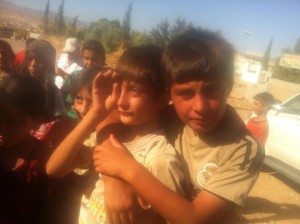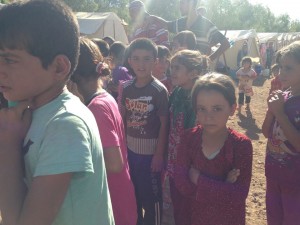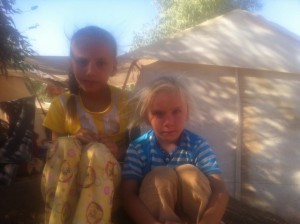A Day with Yezidis in Camps around Duhok and Zakho
 We left Erbil in the morning two weeks ago to meet the Yezidis who had managed to escape ISIS terror, Shoresh Rahem, KRG’s representative in Sweden, another friend and I. The camps in Duhok and Zakho were filled with people fleeing Sinjar, women, men and children. They were also filled with horrific stories. I knew this would be a difficult journey, both emotionally and mentally. I thought I was prepared. I had been working with refugees fleeing war-torn Syria, on the border in Zaatari Refugee Camp (Jordan) and also here in South Kurdistan. Each time, there were new people, different faces, always with heartbreaking stories. But this time things were different. These Yezidis had been through a journey from hell, escaping the barbarism of ISIS, barefoot walking for hours, days, and even weeks in the heat to reach safety, leaving behind their loved ones, some alive, others dead.
We left Erbil in the morning two weeks ago to meet the Yezidis who had managed to escape ISIS terror, Shoresh Rahem, KRG’s representative in Sweden, another friend and I. The camps in Duhok and Zakho were filled with people fleeing Sinjar, women, men and children. They were also filled with horrific stories. I knew this would be a difficult journey, both emotionally and mentally. I thought I was prepared. I had been working with refugees fleeing war-torn Syria, on the border in Zaatari Refugee Camp (Jordan) and also here in South Kurdistan. Each time, there were new people, different faces, always with heartbreaking stories. But this time things were different. These Yezidis had been through a journey from hell, escaping the barbarism of ISIS, barefoot walking for hours, days, and even weeks in the heat to reach safety, leaving behind their loved ones, some alive, others dead.
We passed several half-finished buildings on our way to Duhok and Zahko, full of displaced people. Provisory shelters had been set up everywhere. They had roofs over their heads, no walls to keep them warm at nights, but roofs to keep them dry. I thought to myself that this was better than I initially had expected.
Our first stop was Zahko, a town close to the border to North Kurdistan. A small group of doctors from the Kurdish Medical Association in Sweden greeted us. These amazing doctors have voluntarily travelled here, using nothing but their own money, to help the survivors of ISIS’ terrorism, and the tens of thousands of displaced Yezidis. The need for medical treatment is enormous, the task seems too daunting, but they are focused on assisting as many as possible.
We saw with our eyes how they were saving lives, how needed they are here, but also how limited their available resources are. They have the will, motivation and the spirit to help, but they are only a handful. I had the pleasure to meet these Swedish-Kurdish doctors, and feel humbled by their dedication, passion, and sympathy for their work. They left Sweden to help the survivors of a brutal genocidal campaign by ISIS, not only targeting Yezidis, but other minorities as well, such as Assyrians, Turkomen, Shabaks, and Kakayis. I salute them for their compassion towards human life, regardless of ethnicity or religion.
 One of the camps that we went to in Zahko was “unofficial”, it wasn’t managed by either KRG (Kurdistan Regional Government) or the United Nations. The camp owner, a private person in his mid-40s, had opened up his heart to nearly 5 000 Yezidis on his own. He provided them with tents, food and water, and was still expecting more displaced people. We asked him how he managed this immense task all by himself, what made him do this alone. The answer was clear; someone had to help. He explained that it was his duty to do what he could to alleviate their pain. Like so many of us, he had left Kurdistan years ago in search for safety as a refugee in Europe. As much as I admired his kindness and great generosity, I started to feel frustrated. Where was the help that the international community had been promising? Why did it take so long before aid reached the people? Was the mass exodus of 1991 happening again, while the world was watching?
One of the camps that we went to in Zahko was “unofficial”, it wasn’t managed by either KRG (Kurdistan Regional Government) or the United Nations. The camp owner, a private person in his mid-40s, had opened up his heart to nearly 5 000 Yezidis on his own. He provided them with tents, food and water, and was still expecting more displaced people. We asked him how he managed this immense task all by himself, what made him do this alone. The answer was clear; someone had to help. He explained that it was his duty to do what he could to alleviate their pain. Like so many of us, he had left Kurdistan years ago in search for safety as a refugee in Europe. As much as I admired his kindness and great generosity, I started to feel frustrated. Where was the help that the international community had been promising? Why did it take so long before aid reached the people? Was the mass exodus of 1991 happening again, while the world was watching?
In another camp in Duhok, over 75 000 Yezidis were getting 1 meal per day, standing in lines for hours to get a few pieces of bread and something to drink. People started noticing our car but seemed unsure of whether to trust us or not. A teenage boy finally approached me, he could barely tell me what he wanted to say, his eyes were filled with tears but he tried his best to hold them back. His voice was shaking. He then managed to tell me that his family was sharing two small pieces of bread on 12 people, the same thing everyday, and that they constantly were hungry. He looked at me, waiting for my response. I told him that the important thing was that they were alive and together, and that more help would be arriving soon. I saw the disappointment in his eyes. I might as well not have said anything at all.
An older man saw us, rushed up to us and told us that he lit cigarettes during the nights to keep his hands and fingers warm, he did not have a blanket, nor did he have a tent. The heat from the cigarettes provided him with a sense of feeling of being warm, just for a few minutes. He was lying on the ground, with nothing under him. Where were the tents? The blankets?
A girl, not older than 15, broke down in front of us, telling us how ISIS had killed her father. She described how the terrorists had separated the men, the women and the children. She had managed to escape with her mother. At this point, I couldn’t breathe properly because of all the loud cries inside my head, not only theirs but mine as well. How do I comfort this Yezidi child who just lost her father in the most brutal way?
 The stories continued, more people needed to be listened to, their stories needed to be told. An older woman, nearly 80, had lost all hope. Her eyes were not shining anymore. She asked us why they were being targeted, what had Yezidis ever done to ISIS? Why had Yezidis been targeted throughout history? All they wanted was to be able to practice their beliefs, without hurting anyone. I had no answer to her, nor did I have an answer to the mother crying for her abducted children, or to the father showing us his malnourished and disabled child who was starving in front of our eyes. I wanted to tell all of them that their cries were heard beyond our Kurdish mountains, but I did not have the answers that they wanted to hear. I went to the car and I broke down.
The stories continued, more people needed to be listened to, their stories needed to be told. An older woman, nearly 80, had lost all hope. Her eyes were not shining anymore. She asked us why they were being targeted, what had Yezidis ever done to ISIS? Why had Yezidis been targeted throughout history? All they wanted was to be able to practice their beliefs, without hurting anyone. I had no answer to her, nor did I have an answer to the mother crying for her abducted children, or to the father showing us his malnourished and disabled child who was starving in front of our eyes. I wanted to tell all of them that their cries were heard beyond our Kurdish mountains, but I did not have the answers that they wanted to hear. I went to the car and I broke down.
It took 2 weeks for the international community to realize both the scale and gravity of the problem. Nearly 1.5 million people are now internally displaced and live here in South Kurdistan, this on top of a population of around 5 million. We saw Yezidis everywhere we went, in parks, in empty buildings, and along the roads. Almost 700 schools in Duhok have been closed down due to the fact that they are being used as shelters, and the start of this school semester is now unclear for tens of thousands of children. In addition, some 300 000 refugees from West Kurdistan live here since the eruption of the war in Syria. The scale of the crisis and the pressure and strains it puts on Kurdistan, its people and the Kurdistan Regional Government, cannot be overestimated. We need all the help we can get, on a humanitarian level, a political level and on a military level. And we need it urgently.
Kurds and non-Kurds in Sweden are right now mobilizing on a large scale, holding several campaigns, collecting clothes, shoes, sanitation products, they are arranging galas and concerts to raise awareness and funds. They participate in different events and write articles about the tragedy, about the ongoing crimes against humanity. Others return to Kurdistan to help from here, they volunteer as doctors, they distribute clothes, baby milk, and diapers in private capacity, and some join the Peshmerga forces in their fight against ISIS.
These courageous people should not be criminalized for risking their own lives while defending the minorities in Kurdistan and for saving other lives, which could be the implication if a law that currently is being proposed in Sweden would become a reality. These Swedes of Kurdish origin do not wish to stand by and watch while Sweden and the international community neglects the international, humanitarian principle of “never again”. Kurds have been through ethnic cleansing, mass exodus, and refugee crises before. Another genocide is taking place right now and it needs to be stopped. How many do we have to go through before the world hears our cries?
By
Xoncha Nouri (KRG in Erbil but writing in personal capacity)
Shoresh Rahem (KRG representative in Sweden)
The Alliance for Kurdish Rights aims to amplify diverse Kurdish voices. Views expressed by our authors and contributors are not necessarily our own. We welcome constructive and respectful feedback and discussions. If you’d like to contribute to AKR, join us.
Comments
Angående din artikel i SvD idag:
Problemet är nog inte så enkelt. Men att dessa skickas tillbaka till norra Irak är inte i ordning.
Det finns ju Dublinavtalet och PKK inordnas ju av Turkiet som terrorister.